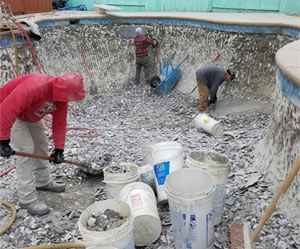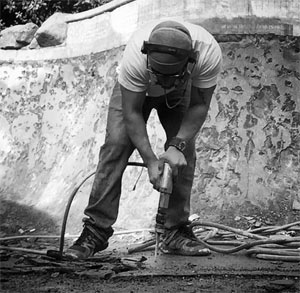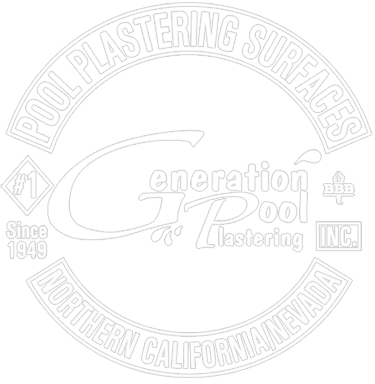Preping Methods
There are two industry methods to getting a new surface to bond. Complete surface stripping and sandblasting the original surface. Generation specializes in complete surface stripping as it is the sure-fire, correct way that comes with our lifetime warranty for bonding adhesion.
Stripping a pool surface before plastering.

In all cases, it is well advised that the surface be removed rather than just sandblasted. Sand blasting and the use of a synthetic bonding is not a guaranteed, effective process for permanent adhesion.
With sandblasting, though solid and bonding at the time of completion the underlying original surface will continue to deteriorate causing the new surface to eventually fail with time. How long and how much will not bond? It’s a gamble. When doing estimates, I’ve visited job sites where the pool was only 3 years old, and others that were over 15 years old. Most have had bonding failure to one degree or another. When and whether or not the second layer will lift and pull away is never precise. This may not be a chance you want to take when investing into your swimming pool. It’s not a chance we choose to take with our customers.
Stripping the surface with small chipping hammers does take more time to do, entails expensive equipment, and the surface to be overlaid does take more material for coverage. So expect to pay more than a competitor that isn't.
 4 Reasons why a contractor would not strip your plaster surface off before resurfacing
4 Reasons why a contractor would not strip your plaster surface off before resurfacing
- May not have the proper equipment.
- May not have the proper experience.
- May not have the proper labor.
- Budget constraints.
3 Reasons why a pool will de-bond.
Human error. Workers may fail to thoroughly sand blast, water blast surface, and mix thoroughly a synthetic bonding agent.
Natural trait of cement and sand. Plaster surfaces are made up of raw mined, soluble minerals that will age (dissolve) with time. As it continues to age (after being plastered over), the new surface will pull away from the old surface. There is no pool plaster surface that stops dissolving, even after it’s run it’s life expectancy. Makes no difference how old it is.
Defective product. There is nothing worse when contractors do all they can to provide a sure bond, but the bonding agent does not perform as expected. Bonding agents over the past 35 years; unfortunately have been known to do this. Not to just one pool at a time, but whatever jobs, from as many different companies, simultaneously of which the same brand was used.
The photos below show jobs I visited where unfortunate consumers had to revisit the expense of resurfacing their pool over again due to de-bonding issues. With no warranty clause regarding longevity of bonding, they were dishing out more money of their own. All these jobs where done in under 5 years.
Note: None were ours.





